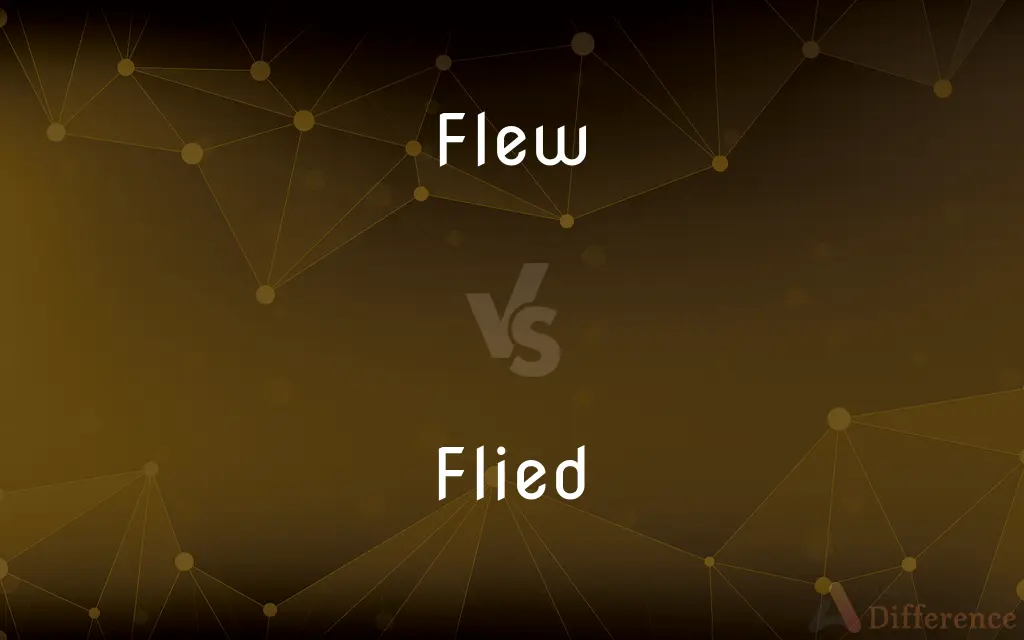Flew vs. Flied — What's the Difference?
By Maham Liaqat & Urooj Arif — Updated on March 8, 2024
Flew relates to the past tense of fly, indicating motion through the air. Flied, though less common, is used in baseball to describe a fly ball that's been caught.

Difference Between Flew and Flied
Table of Contents
ADVERTISEMENT
Key Differences
Flew is the standard past tense of "fly," referring to moving through the air, usually by wings. It's used in various contexts, from birds flying south for the winter to someone flying to another country. On the other hand, "flied" is a term primarily used in baseball, denoting a specific action where a player hits a fly ball that is caught by a fielder. It's an exception to the general use of "flew" as the past tense of fly, tailored to fit a particular jargon.
Flew is broadly applicable in everyday language, literature, and science, describing the action of moving through the air. Whether it's an aircraft, a bird, or even time flying by, "flew" conveys a sense of movement and freedom. Conversely, "flied" is restricted to the baseball field, highlighting the specialized language used within sports. This terminology caters to the specific rules and play actions within the game.
Flew is used in general statements about past movements in the air and can describe both literal and figurative flights. For example, describing how a day flew by or how a bird flew across the sky. Flied, however, is never used outside its baseball context, emphasizing its niche application. This contrast shows how language evolves to meet the specific needs of different communities and disciplines.
Flew can convey various aspects of flight, including speed, direction, and manner, enriching a narrative or description. It allows for a broad range of expressions, from poetic to technical. In contrast, "flied" has a very narrow function, simply indicating a fly ball's outcome in baseball, offering little room for descriptive flexibility.
Flew and flied showcase the dynamic nature of language, where "flew" remains a staple in English vocabulary for indicating past motion through air, while "flied" serves as a reminder of how specialized terms can arise to meet specific communicative needs in areas like sports. This diversity in usage underlines the richness of English, capable of accommodating everyday conversations and specialized communications alike.
ADVERTISEMENT
Comparison Chart
Definition
Past tense of fly, indicating motion through air.
Baseball term for a fly ball that's been caught.
Usage Context
General, applicable in various contexts.
Specific to baseball.
Linguistic Flexibility
Broad, describes various aspects of flight.
Narrow, limited to describing a specific play.
Applicability
Universal, beyond just sports.
Exclusive to baseball jargon.
Figurative Use
Common, e.g., time flying by.
None, strictly literal within its context.
Compare with Definitions
Flew
Can imply escaping or moving swiftly from a place.
The thief flew from the scene.
Flied
Flied describes a baseball hit where the ball is caught in the air.
He flied out to center field.
Flew
Indicates rapid movement or passage of time.
The weekend flew by so quickly.
Flied
Indicates a specific outcome of a batting attempt.
With that hit, he flied out for the third time.
Flew
Flew refers to having moved through the air in the past.
The eagle flew over the mountains.
Flied
Used exclusively within the context of baseball plays.
The batter flied to the shortstop.
Flew
Reflects a direct action undertaken by birds, insects, or man-made devices.
The drone flew out of sight.
Flied
Relates to fielding actions in baseball.
The outfielder is prepared to catch any ball that's flied.
Flew
Used to describe traveling by aircraft.
She flew to Paris for the conference.
Flied
Part of baseball's specialized terminology.
Flied balls often determine the batter's strategy.
Flew
Past tense of fly1.
Flied
Past tense and past participle of fly1.
Flew
(chiefly plural) The thick, dangling upper lip of certain breeds of dog, or the canine equivalent of the upper lip.
The raging hound's flews were twisted upwards in an angry snarl.
Flied
Simple past tense and past participle of fly(hit a fly ball)
Flew
Shallow; flat
Common Curiosities
Is "flew" applicable to non-living things?
Yes, "flew" can describe anything that moves through the air, including aircraft and birds.
What does "flew" mean?
Flew is the past tense of fly, indicating motion through the air.
Can "flied" be used outside of baseball?
No, "flied" is specific to baseball terminology.
Where is "flied" used?
Flied is used in baseball to describe a fly ball caught by a fielder.
How do "flew" and "flied" differ in application?
"Flew" is used broadly across various contexts, while "flied" is specific to baseball.
Can "flew" have figurative meanings?
Yes, "flew" can also describe the swift passage of time or rapid movement.
Do "flew" and "flied" share any similarities?
Both words relate to actions involving air, but their contexts and applications differ greatly.
What is the origin of "flied" in baseball?
"Flied" derives from baseball's specialized jargon, specifically relating to the outcome of fly balls.
Is "flied" a common term in English?
"Flied" is common within the baseball community but not in general English usage.
Can "flew" indicate speed?
Yes, "flew" often implies a quick or swift movement.
Are there exceptions to using "flew" as the past tense of fly?
No, "flew" is the standard past tense form for fly, except in baseball jargon where "flied" is used.
How does "flew" enhance narrative descriptions?
"Flew" offers flexibility in describing the manner, speed, and direction of flight, enriching narratives.
Can "flew" be used in a technical context?
Yes, "flew" can be used in both technical and non-technical descriptions of flight.
Why is "flied" not used outside of baseball?
"Flied" is tailored to the specific actions and rules of baseball, making it irrelevant in other contexts.
How do "flew" and "flied" reflect language flexibility?
They showcase how English adapts to specific contexts, with "flew" serving broad usage and "flied" meeting niche needs.
Share Your Discovery

Previous Comparison
Pine vs. Maple
Next Comparison
Lollipop vs. LollyAuthor Spotlight
Written by
Maham LiaqatCo-written by
Urooj ArifUrooj is a skilled content writer at Ask Difference, known for her exceptional ability to simplify complex topics into engaging and informative content. With a passion for research and a flair for clear, concise writing, she consistently delivers articles that resonate with our diverse audience.















































